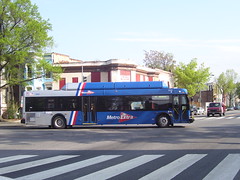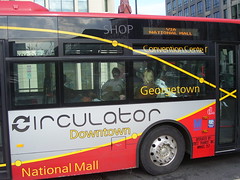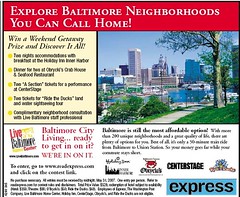Social Marketing the Arlington (and Tower Hamlets and Baltimore) way

Okay, the Commuter blog mentioned that I wrote about the Alrington Car Free Diet Expo, and said there might be more to come. That goosed me, because I wouldn't normally be able to get to it for awhile, and I still haven't uploaded any of my own photos. But here goes...
I am not sure that Arlington fully understands exactly why they are doing so great (maybe they do, and I have never met Diana Sun, the Communications Director for the County) but here is my interpretation. Besides starting with important values and vision, and getting all County agencies committed and executing on the same page with the same philosophy, they have figured out a way to lead change by using social marketing and "design" principles. They combine
1. The Design method;
2. Social marketing principles for behavior change -- A focus on transformation -- not merely "change" or "innovation" (not to mention "system maintenance"); and
3. Development and execution of complete and strategic campaigns;
4. Built upon the creation of complete identity systems and brands. (Logos aren't brands. They are part of a branding-identity system.)
DC1974/Inaudible Noise and I have been discussing the Design Method for some time now.
Recently I went through a great book Designing Brand Identity and I came across another, WorldBranding, that I saw at the Rizzoli bookstore--the Library of Congress doesn't even have that book yet. Plus I've picked up some others, including Wayfinding: Designing and Implementing Graphic Navigational Systems. and Festival Graphics.

The other day he sent me a link to this piece, "How a design thinking approach can help librarians" from the Putting People First blog (which I am going to have to add to my very short list of must read blogs -- Commuterblog, Washcycle, Streetsblog, maybe CEO for Cities, Frozen Tropics). This graphic is from that entry.

The Design Process.
--------------------
NOTE: VERY IMPORTANT. Note the "Evaluate" and "Refine" stages. Governments rarely prototype. (Not to mention aren't usually great at marketing or graphic design and as importantly, "verve" -- I mean, compare DC's "Metro Extra" bus design to the "Metro Rapid" design in Los Angeles. Or the awful "America's Metro" logo proposed for the "next generation" subway cars. Although the DC Circulator has decent graphics.)
I would probably change this schematic a little, and include prototyping and testing within a combined "Prototype, Test, and Refine" stage.
--------------------




Then you add to that social marketing, as pioneered by Porter, Novelli, and others. There are good books on the subject by Fine, one co-authored by Philip Kotler, plus Lauffer's out-of-print Marketing for Not-for-Profit Organizations and Kotler and Andreasen's Marketing for Nonprofit Organizations.
And they encapsulate this into "brands" and campaigns such as "The Commuter Store" "Walk Arlington" "Fit Arlington" "Bike Arlington" and now the "Car Free Diet."
I guess you could argue that social marketing has antecedents in direct marketing, which is testable. A particularly good, but old book on the subject is Maximarketing by Stan Rapp, and I've always liked The Marketing Imagination by Ted Leavitt.
The Commuter Store was started not by Arlington County but by the Ballston Partnerhip (or a precursor), but that set the stage for this deeper emphasis. A problem with the Commuter Store" as strong as a brand as it is, it emphasizes transit as being mostly for commuting, not transit as a way of life, as part of your lifestyle. Nonetheless, the concept is strong and has been adopted in other jurisdictions around the region.

Rosslyn Commuter Store photos from the Commuter Page website.

I think the brand can be better extended with a good tagline linking other forms of mobility--biking, walking, etc.
Plus, biking and walking need to be given their own dedicated sections within the "stores" to emphasize their importance, as well as the emphasis that Arlington County does give to walking and mobility.
Arlington does something that I always emphasize with nonprofits, that each thing you do needs to accomplish multiple objectives. So Walk Arlington promotes mobility, promotes fitness, and on tours of neighborhoods promotes community building as well as communication about cultural and other resources, not to mention focuses on improving the physical environment (urban design) for walking.
Single-track thinking and doing is unaffordable by any municipality, given ever constrained resources and increasing demands.
Two other places that use the same kinds of organizing principles are:
• Baltimore's Live Baltimore resident attraction program, which is a campaign and focused process that also happens to have a storefront. See "Selling the city: For 10 years, Live Baltimore has been convincing Washington residents and others that city living is charming," from the Baltimore Sun.

• The way that the Tower Hamlets borough of London repositioned their library system into the Idea Store which they describe as:
more than just a library or a place of learning. As well as the traditional library service, Idea Stores offer a wide range of adult education classes, along with career support, training, meeting areas, cafes and arts and leisure pursuits.

Arlington is more focused directly on behavior change when compared to the Idea Store, but Live Baltimore too is very focused, on attracting residents.
Labels: asset-based community development, branding-identity, innovation, planned change



0 Comments:
Post a Comment
<< Home